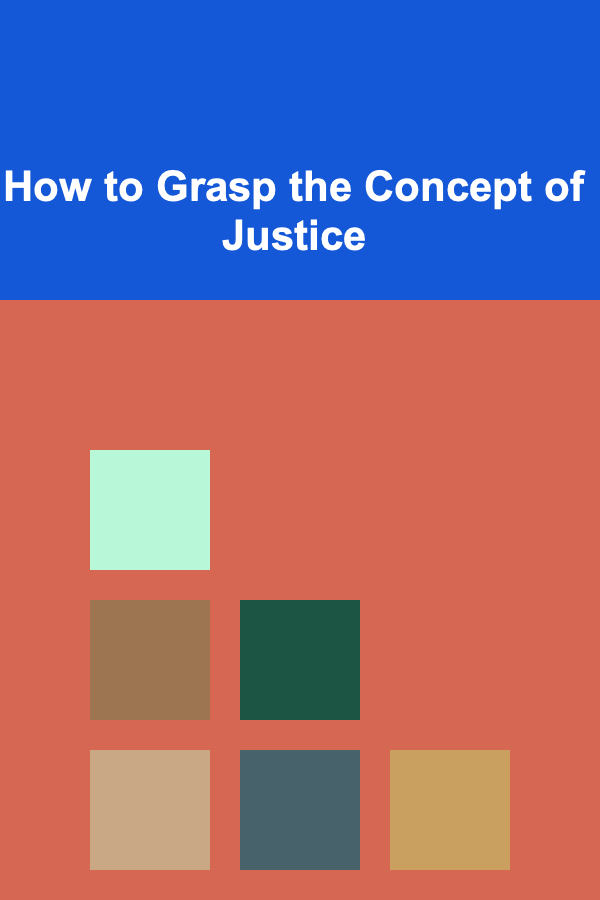
How to Grasp the Concept of Justice
ebook include PDF & Audio bundle (Micro Guide)
$12.99$11.99
Limited Time Offer! Order within the next:

Justice is one of the most fundamental and complex concepts in human societies, influencing laws, ethical principles, and social norms across civilizations. It plays a pivotal role in shaping how individuals relate to one another, how societies function, and how fairness is perceived in everyday interactions. However, justice is not a straightforward or universally agreed-upon concept. It is multifaceted, encompassing legal, moral, political, and social dimensions that vary across cultures, historical contexts, and philosophical perspectives.
In this article, we aim to explore how to grasp the concept of justice, not only from an academic perspective but in terms of practical application in our daily lives. By understanding its various dimensions, one can better appreciate its complexity, internalize its significance, and apply it to contemporary issues, from legal systems to personal relationships.
Defining Justice: A Multifaceted Concept
At its core, justice can be described as the fair and equitable treatment of individuals within a society, ensuring that rights and duties are distributed in a manner that is just. However, this general definition only scratches the surface. Justice can be broken down into several distinct dimensions, each of which carries a different emphasis on fairness, equality, and the allocation of resources or rights.
1.1. Legal Justice
Legal justice refers to the application of laws and legal frameworks to maintain order and resolve disputes within a society. It is concerned with ensuring that laws are applied fairly and consistently, protecting individuals' rights and liberties. Legal justice often involves the balance between the rights of the individual and the rights of society as a whole.
In democratic societies, legal justice is often linked to the concept of rule of law, which asserts that laws, rather than individuals or governments, should govern society. This ensures that laws are applied uniformly, and no one is above the law. A system of legal justice is intended to provide fair trials, reasonable due process, and impartial adjudication in cases of wrongdoing.
1.2. Moral Justice
Moral justice, on the other hand, pertains to ethical principles about what is right or wrong, good or bad, just or unjust. While legal justice is governed by codified rules and statutes, moral justice is guided by societal norms, cultural values, and individual beliefs about fairness and ethics.
Philosophers have long debated the foundations of moral justice. Some advocate for utilitarianism , where the just action is that which promotes the greatest good for the greatest number. Others argue for deontological approaches, where actions are inherently right or wrong regardless of the consequences. In either case, moral justice strives to ensure that individuals act in accordance with ethical principles, whether or not those principles are enshrined in the law.
1.3. Social Justice
Social justice expands the scope of justice beyond individual interactions to include the broader issues of inequality, opportunity, and access within society. It is concerned with the fair distribution of resources, opportunities, and privileges, addressing systemic disparities that may arise due to race, class, gender, or other social factors.
The concept of social justice often calls for corrective actions to level the playing field. This might involve policies and practices that reduce poverty, improve education, ensure equal rights, and promote diversity and inclusion. Social justice advocates argue that society must actively work to address the inequities and discrimination that prevent certain groups from having the same opportunities and access as others.
1.4. Distributive Justice
Distributive justice deals with the fair allocation of resources in a society. It asks questions about how wealth, opportunities, and burdens should be shared among individuals or groups. Various theories of distributive justice exist, depending on how the concept of fairness is defined.
- Egalitarianism: This approach advocates for equal distribution of resources, ensuring that everyone has the same access to wealth, healthcare, education, and other societal goods.
- Meritocracy: This perspective suggests that resources should be distributed based on individual merit or effort, meaning those who contribute more or perform better should receive greater rewards.
- Needs-Based Justice: This approach argues that resources should be allocated based on individual needs, ensuring that those who are most disadvantaged or vulnerable receive the most help.
The debate around distributive justice is deeply linked to questions about economic systems (capitalism, socialism, etc.), the role of the state, and the nature of fairness in society.
1.5. Restorative Justice
Restorative justice is an approach to justice that focuses on repairing the harm done by wrongdoing, rather than simply punishing the offender. It is often used in the context of criminal justice systems, but it has broader applications in interpersonal and community disputes as well.
The central idea behind restorative justice is that justice is best served when the victim's harm is acknowledged, the offender takes responsibility, and both parties engage in dialogue to come to a mutual understanding. Restorative justice aims to heal relationships, restore dignity, and foster a sense of responsibility among both offenders and victims.
Historical Perspectives on Justice
The concept of justice has evolved significantly over the course of human history. From the ancient Greek philosophers to contemporary theorists, numerous thinkers have contributed to the understanding of justice, each offering unique insights that have shaped modern approaches to fairness and equity.
2.1. Ancient Greek Philosophy
The ancient Greeks laid the intellectual foundations for much of Western thought about justice. Plato , in his work The Republic, described justice as the harmony that arises when individuals fulfill their roles within society according to their abilities. For Plato, justice was an ideal state in which each person contributes to the common good, with rulers being philosopher-kings, warriors defending the city, and workers providing for material needs.
Aristotle , a student of Plato, had a more pragmatic view of justice. He argued in Nicomachean Ethics that justice is found in fairness, which is achieved when individuals receive what they deserve based on their actions. Aristotle distinguished between distributive justice , which concerns the allocation of benefits and burdens, and rectificatory justice, which aims to correct wrongs and ensure fairness in transactions.
2.2. Roman and Medieval Ideas of Justice
In Roman law, the concept of natural law emerged, emphasizing that certain rights are inherent in human nature and that justice is the enforcement of these natural laws. Roman thinkers like Cicero argued that justice is not just a human convention but a reflection of universal, divine principles.
During the medieval period, St. Augustine and Thomas Aquinas integrated Christian theology with ideas of justice. Aquinas, in particular, argued that human laws should align with divine law and that justice was a virtue that guided individuals toward moral perfection.
2.3. Enlightenment Thinkers
The Enlightenment period brought a new, secular approach to justice. Philosophers such as John Locke and Jean-Jacques Rousseau emphasized the importance of individual rights and the social contract. Locke argued that justice was grounded in the protection of private property and individual freedoms, while Rousseau proposed that justice is achieved when society functions based on the collective will of the people (the general will).
The Enlightenment thinkers set the stage for modern democratic systems, in which justice is often understood in terms of individual rights, equality before the law, and the protection of liberties.
Grasping Justice in the Modern World
3.1. Justice in Legal Systems
In the modern world, justice is often closely associated with legal systems. Countries around the globe have developed complex legal frameworks to regulate behavior, resolve disputes, and punish wrongdoing. However, the effectiveness of these systems in delivering justice can vary widely.
The principle of due process is fundamental to ensuring legal justice, which protects individuals from arbitrary or unjust actions by the state. In democratic societies, legal justice is often pursued through a system of checks and balances, including courts, legislatures, and executive bodies that ensure laws are applied fairly and consistently.
3.2. Social Justice Movements
In recent decades, social justice movements have become increasingly prominent. Issues such as racial equality, gender rights, LGBTQ+ rights, environmental justice, and economic inequality have all been central to discussions about justice in the modern world. Social justice advocates seek to address historical injustices and dismantle systems of oppression that disproportionately affect marginalized groups.
The Civil Rights Movement in the United States, feminist movements around the world, and the fight for indigenous rights are all examples of efforts to achieve greater justice in society. These movements have highlighted the need for greater equity in education, employment, healthcare, and housing.
3.3. Global Justice
Global justice refers to the ethical and moral considerations that govern how nations and individuals should interact on the world stage. Issues such as climate change, human rights, global poverty, and refugee rights are central to global justice debates.
The United Nations and other international organizations play key roles in promoting global justice through initiatives like the Universal Declaration of Human Rights and international treaties that aim to protect vulnerable populations and ensure sustainable development.
The Role of the Individual in Justice
Finally, understanding justice is not just an academic pursuit; it is a call to action for individuals. Every person plays a role in promoting justice within their community, workplace, and beyond. Whether through supporting fair policies, advocating for those whose rights have been violated, or simply treating others with respect and fairness, individuals can make a meaningful impact in promoting justice.
Justice requires personal responsibility, the willingness to challenge unjust systems, and the ability to empathize with those affected by injustice. As citizens and members of society, it is our responsibility to question injustices and work collectively to create a more just world.
Conclusion
Grasping the concept of justice involves understanding its many dimensions---legal, moral, social, distributive, and restorative. It also requires an appreciation of its historical roots and how it manifests in the modern world. Whether considering legal justice in the courts or striving for social justice through activism, justice is an essential concept for maintaining fairness, equality, and human dignity. Through continuous reflection, dialogue, and action, we can deepen our understanding of justice and contribute to a more just and equitable society.

How to Choose the Perfect Holiday Color Scheme for Your Home
Read More
How to Incorporate Built-In Storage in Your Home Design
Read More
How to Organize Your Wedding Photos Like a Pro
Read More
How to Use Dollar-Cost Averaging for Stock Market Investment
Read More
Creating Designs for POD Accessories: Totes and Bags
Read More
How to Design a Weekly Home Cleaning Checklist
Read MoreOther Products

How to Choose the Perfect Holiday Color Scheme for Your Home
Read More
How to Incorporate Built-In Storage in Your Home Design
Read More
How to Organize Your Wedding Photos Like a Pro
Read More
How to Use Dollar-Cost Averaging for Stock Market Investment
Read More
Creating Designs for POD Accessories: Totes and Bags
Read More